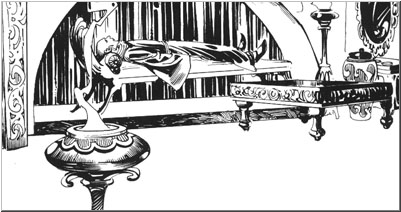
The Black Lotus

"A glance back, before the heavy, gold-bound teak door was closed, showed him Xaltotun leaning back in his throne-like chair, his arms folded, while a thin wisp of smoke curled up from the brazier. Conan's scalp prickled. In Stygia, that ancient and evil kingdom that lay far to the south, he had seen such black dust before. It was the pollen of the black lotus, which creates death-like sleep and monstrous dreams; and he knew that only the grisly wizards of the Black Ring, which is the nadir of evil, voluntarily seek the scarlet nightmares of the black lotus, to revive their necromantic powers." -- Robert E. Howard: "Hour of the Dragon"

Although the Black Lotus is a lethal poison, it has certain magic-restoring properties the dark mages of Stygia and elsewhere have learned to use to their advantage. In the Saga, Xaltotun, Thoth-Amon and Yara all used the restorative powers of the Black Lotus.

At the DM's option, the following optional rule can be used in the campaign. It applies both to wizards and clerics.
Benefit: When a spellcaster burns the dust of the black lotus in a bowl, and then spends one or more hours inhaling its dark green fumes (in a catatonic, drugged slumber), the drug enables him to temporarily increase his effective caster level. The number of extra levels gained is equal to the number of hours spent in drugged slumber. These extra levels last for a number of hours equal to twice the hours spent in drugged slumber.
The extra caster levels apply to all level-dependant variables in a spell's description (such as range, damage, etc.), and grants the caster additional spells as if he was of a higher level. Note that the spellcaster does not gain access to higher-level spells than his actual level allows, but may use higher-level spell slots for metamagic-enhanced spells. Other level-dependant attributes, such as hit points and saving throws, are not affected.
Of course, acquiring and using black lotus dust is hardly a trivial nor inexpensive affair. Repeated use of this technique might cause addiction to the Black Lotus.
Addiction: Black Lotus is a drug with an Extreme addiction rating. Anytime a character inhales its burnt fumes, he must make a Fortitude saving throw (DC 25, +1 for each hour spent in drugged slumber) or become addicted. While addicted, the character must make a new Fortitude save each day (using the initial DC, and see below) or suffer temporary ability damage: 1d6 Dex, 1d6 Wis and 1d6 Con. At the DM's option, the spellcaster might also be haunted by scarlet nightmares and evil visions (perhaps manifesting as phantasmal killer or nightmare effects).
A character that becomes addicted must inhale Black Lotus fumes every day, or the DC to resist the ability damage caused by addiction increases by +5.
Overcoming addiction: If an addicted character makes two successful saving throws in a row, he has fought off his addiction and recovers, suffering no more ability damage.
A lesser restoration or restoration spell may negate some or all of the ability damage caused by addiction, but on the next day the character may suffer more ability damage if he continues to fail his saves. Remove disease immediately cures the addiction, but does not recover lost ability score points. Greater restoration or heal causes recovery and restores all ability damage. At the DM's option, even these spells might not be able to remove addiction if the character has been using Black Lotus voluntarily for long periods of time.
Example: Yara, a 10th-level Zamoran wizard, acquires a dose of Black Lotus. He retreats to his chambers and inhales its dark green fumes for three hours, which increases his effective level to 13 (10 + 3) for 6 (3 hours x 2) hours. He gains one additional spell slot for 3rd-, 4th- and 5th-level spells, as well as two 6th-level and one 7th-level spell slot. Yara is not of a sufficient level to cast 6th- or 7th-level spells, but may use (for example) the 7th-level spell slot to cast a maximized 4th-level spell. His effective level for the purposes of determining duration, range, etc. is 13.
However, Yara must make a Fortitude saving throw (DC 25 + 3 for the three hours spent in drugged slumber = 28). He fails the save and becomes addicted to Black Lotus. The next day, he must inhale its fumes again and make a new save. Since he doesn't have any more supplies of the lotus, the DC becomes 28 + 5 = 33. He fails again and suffers 1d6 points of Dex, Wis and Con damage. Half-crazed, Yara summons his servants and instruct them to acquire more Black Lotus, regardless of its cost (if they succeed in bringing him more lotus, the DC will again be reduced to 28). He also needs to start looking for a priest able to cast remove disease or restoration spells...
